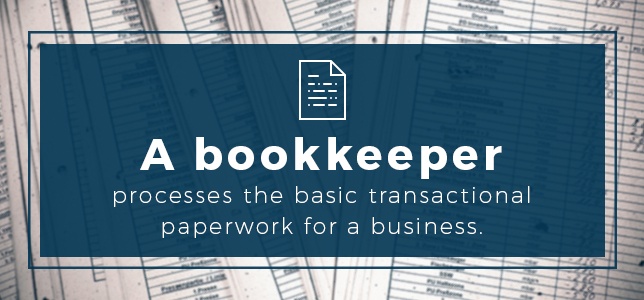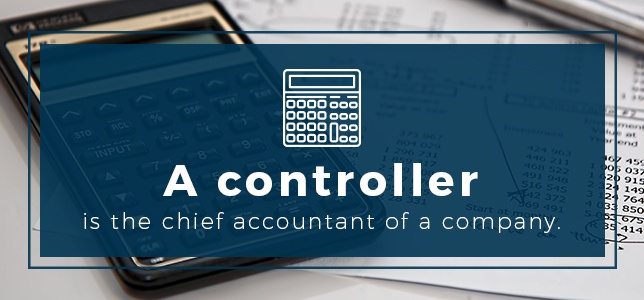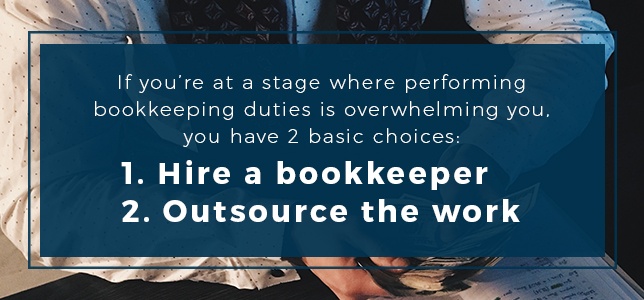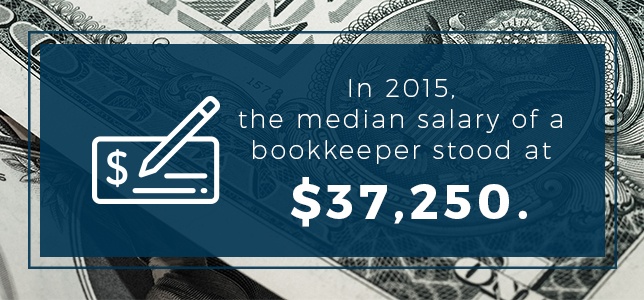What's the Difference Between a Bookkeeper, Controller and CFO?
Most small businesses and startups need nothing more than a bookkeeper in their earliest phases — someone to keep the accounting records current and to produce basic financial statements. You will eventually need multiple bookkeepers and maybe a tax accountant to keep your books and tax situation in top shape. If you begin to feel the need to secure more complex financing than you might find in a trip to the bank, it’s time to consider the difference between a bookkeeper, a controller and a chief financial officer (CFO).
In larger or more mature companies, each has a specific role to perform. Determining whether your company needs all three will depend on your assessment of the breadth, depth and complexity of your financial needs.
Let’s take a look at the basic definitions of each role.

What Does a Bookkeeper Do?
A bookkeeper processes the basic transactional paperwork for a business. Depending on the size of the business, it could mean simply processing one type of account, such as accounts payable. It could also mean processing all of the business’s accounting paperwork, including accounts payable, accounts receivable, inventory accounts and payroll. In very small businesses, the bookkeeper’s role might be expanded to producing basic income statements and other financial statements.
The nature of the work demands accuracy in a bookkeeper’s role, as well as an understanding of the relationship between double-entry books and various accounting ledgers. The role can either be filled by a full-time employee of the business or through an outsourcing firm, such as SLC Bookkeeping, that can tailor a work plan to the needs of your particular business.
In essence, a bookkeeper provides you with an accurate accounting of your business’s activity, and that is as far as the role extends. For tax strategies or help with structuring your business or your financing, you may need to bring on further levels of help. For insight into what that might mean, let’s take a look at the roles of a controller and a CFO.

What Does a Controller Do?
A controller is the chief accountant of a company. He or she has control over and responsibility for any other accountants and bookkeepers. As an accountant, the controller is responsible for interpreting the meaning of a company’s financial statements and data, as well as ensuring their accuracy.
The concept of interpretation is the key difference between a controller and a bookkeeper. A controller is a key financial advisor who would be expected to give the top management team advice on any number of issues relating to the business’s financial situation or the regulatory climate, such as proper staffing levels, expense controls, fraud controls and tax strategy.
In addition, the controller is responsible for ensuring your company complies with financial reporting rules and laws. Perhaps most crucial to the role, the controller is responsible for budgeting and monitoring performance throughout the year against the annual budget — a key factor that any business owner or executive team needs to track to ensure the company is operating according to the master plan.
If the business deviates significantly from its budget, the controller should be able to determine where and how the deviation has occurred and make recommendations on what to do about it. The strategy could include adjustments to operations, the budget or both, depending on the circumstances.
Without a controller to keep a sharp eye on the numbers, other key managers would be unaware of the need to take any sort of action at all.

What Does a CFO Do?
The final major component of a fully developed financial team is the chief financial officer (CFO), a position that adds yet more layers of financial expertise to the accounting, reporting and interpreting functions of the bookkeeper and controller.
As the principal financial officer of a company, the CFO oversees the functions of the controller. In addition, a CFO plays a much larger role in the company’s overall direction.
In conjunction with the chief executive officer, a CFO is responsible for guiding a company’s capital structure. For example, a CFO might help executive management determine whether a significant infusion of cash is needed to carry out an expansion of operations or the acquisition of another company. A CFO might also determine whether it might be in the company’s best interest to obtain cash through a stock issuance, debt sale or some other type of loan, or through a combination of methods.
Externally, the CFO is the public face of the company’s finances. The officer is responsible for compiling data and information that a publicly owned company might be required to publish. He or she is chiefly responsible for accurately portraying the company’s financial situation to potential lenders and investors regardless of the company’s structure.
Internally, the CFO is responsible for monitoring and adjusting cash flows and other key components of a business’s financial makeup. Beyond mere monitoring, a CFO would be expected to suggest changes in operations that might be needed for budget compliance or to improve profitability.
Additionally, a CFO would be expected to help shape a company’s overall strategy. The strategy could include acquisitions going forward or for the company to be acquired. On the other hand, the strategy could include structuring the company for organic growth or defensive pullbacks in operations.
In terms of qualifications, a CFO needs to possess a thorough understanding of accounting functions along with significant training in overall financial management and strategy. Given the public-facing responsibilities required, including the necessity of representing the company’s overall financial health, it does not hurt if the CFO brings a touch of salesmanship to the job, as well.
Developing a Financial Management Team
Few, if any, startups or small companies start out with a bookkeeper, controller and CFO already in place. It’s far more common for the smallest business to start out with, at the least, some sort of bookkeeping software. If that is the case with your company, you, as the owner, may be the bookkeeper, controller and CFO rolled into one.
Remember that every function — bookkeeper, controller and CFO — exist in your company. Regardless of the size of your organization, someone must keep accurate books, analyze them and the financial statements they yield, and direct the company’s spending. Someone must also set the company’s financial tactics and strategy.
Once you clearly see and understand those roles, it is easier to understand when they must be delegated. One person should not be overburdened with tasks that are not part of their core skillset or as crucial to the core of the business. As the owner, your leadership is likely more beneficial in other areas.
What Is a Bookkeeper in Your Company?
For many small businesses, splitting off the bookkeeping function is the first step in assembling a true financial management team. As an owner, you probably have a strong reason for starting, owning and running your own business.
You might be an ace at selling women’s clothing, maybe you are the inventor of a killer new product, or perhaps you are a specialist in a trade. Your core talents probably do not including keeping accurate financial ledgers and payroll records and coaxing regular financial statements out of software that appears to know a lot more about double entry bookkeeping than you do.

If you are at a stage where performing bookkeeping duties is overwhelming your ability to run the most important aspects of your business, you have two basic choices:
- Hire a full-time or part-time bookkeeper and put them on your payroll.
- Outsource the work to a contracting company.
Hiring your own bookkeeper comes with its own potential problems. Adding someone directly to your payroll makes you responsible for payroll taxes and possibly benefit costs. Maintaining the job entirely in-house also requires you to set up some sort of fraud control system. If you are going to hand over the power to write checks on the business’s behalf, for example, you should establish a system where two people — likely you and the bookkeeper — need to sign off on every expenditure to avoid the obvious risk of embezzlement.
You should have the ability to review your business’s books and understand them well enough to ensure your rules are being followed. If you hire a bookkeeper, as bookkeeper alone, remember that you have only taken part of the financial management burden off yourself.
Unless you hire an accountant to keep your books, which may increase the cost of the position considerably, your bookkeeper cannot be expected to offer tax advice, help you determine the best financing structure for your business, manage your cash flows or set strategy. Someone else — likely you — will have to fill the controller and CFO roles.
Outsourcing Your Financial Management Functions
Outsourcing your bookkeeping services is an option that can provide you with more flexibility and security — and less hassle. At SLC Bookkeeping, you can receive help with a set of services that are customized to your business. If you need help setting up secure accounts payable and payroll procedures, for example, we can help. If you need help reconciling your books or you need certain kinds of reports, such as profit and loss statements, at certain times of the week, month, or year, we can help with that as well.
The Cost of Hiring Your Own Financial Management Team

Assembling your own financial management team may become a necessity if your business grows large enough. If you are running a relatively small operation — around 20 employees or less — you might want to carefully consider the cost of assembling an in-house team before you choose that route.
In 2015, the median salary of a bookkeeper stood at $37,250 a year, according to the U.S. Bureau of Labor Statistics. While most bookkeepers lack a college degree, according to the BLS, the skillsets required for the job are still high, requiring at least some postsecondary education in accounting and financial records, as well as considerable on-the-job training.
As one might guess, accounting salaries run higher. The median 2015 salary for an accountant or auditor stood at $75,280, according to the BLS, while top wages ranged over $118,000. They also varied greatly by geography, with average accounting wages in Utah ranging between $68,370 and $73,890. The average in New York State, California and Colorado ranged from $74,700 to $93,000. In Salt Lake City alone, accounting wages averaged $71,740 a year.
Rounding out the list, financial managers commanded a median annual wage of nearly $118,000 in 2015, according to the BLS, which means that half made less but half also made more.
Putting that all together, the cost of hiring a bare-bones in-house financial management team consisting of one bookkeeper, one controller or accountant and one CFO would run an average of more than $230,500 a year.
A Strategy for Buying Financial Management Services
Regardless of the complexity of your business’s financial needs, one truth will always remain certain: For many obvious reasons, you must have a solid and accurate bookkeeping system in place before any other financial tasks can be accomplished.
If you lack a set of accurate and complete books, you cannot know how your business is performing. You cannot properly control what you cannot see or understand, and working with a faulty or incomplete set of books effectively throws a black blanket over your business, preventing you from seeing what you need to see in order to make the most of it.
Other reasons are not as obvious. If you have a set of books that suffice for your own internal management purposes, you may not be able to produce information a lender might want to see in order to give you a crucial loan. Alternatively, you may not be able to produce a set of records that are sufficient to pass an audit or get through the due diligence phase if an opportunity arises to sell your operation.
It is critical to hire a bookkeeper first if you are beginning to assemble a financial management team. Whether you bring on a full-time employee or hire an outsourcing firm is, of course, your choice. Take steps to ensure your books are set up and kept in such a way that proper reports can be generated for every circumstance. They should also be set up in a way that grants you, the owner, and maximum control over your venture.
SLC Bookkeeping offers services that are customized to your company’s needs at far less than the cost of hiring your own team. Contact us to today to explore the possibilities.

Comments